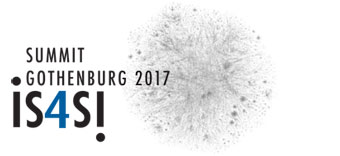The Sixth Difference that Makes a Difference (DTMD) conference
Information, Narrative and Rhetoric: Exploring Meaning in a Digitalised Society
Meaning is embedded within, and defined by, stories. This workshop will explore the use of the language of information in the stories of the digitalised society in order to enhance understanding, both of society and of information.
In our increasingly digitalised society, certain narratives have emerged depicting possible futures of an information society. ‘Smart cities’, ‘big data’ and ‘the internet of things’ constitute perhaps the most obvious examples of such stories, offering somewhat utopian views of a society enhanced through their application. On the other hand digital technologies such as websites and social media are implicated in the spread of fake news and the rise of post-truth politics. Discussions of these developments engage with information and a shared, tacit understanding of its nature in order to generate meaning, rhetoric and the narratives themselves; reflexively, there is also a need to consider the role of rhetoric and narrative in the shift to a digitalised or informational conception of society. The exploration of information and its use, and their intersection with rhetorical considerations gives rise to alternative viewpoints and prompts a range of questions, thereby providing the basis for a valuable critique of emerging ideas and narratives.
In this workshop, the Difference that Makes a Difference (DTMD) group will continue its interdisciplinary/transdisciplinary exploration at the intersection of information and other phenomena by exploring its relationship to narrative and rhetoric. These conversations between – and across – disciplines encourage new perspectives and foster insight into the meanings and values we apply to our lives and way of living.
The workshop will address the following questions (among others):
– How is information represented/embodied through stories and narratives?
– In what way do the structures (e.g. shape and grammars) of stories create information in themselves?
– Is it necessary to have both rhetoric and narrative to create stories? Can narrative-free or rhetoric-free stories exist? For example, can a bitstream or a DNA sequence be considered a story, or do mathematical equations form narratives in themselves?
– What are the processes by which narratives are formed? How are meta-narratives formed, and what is their reflexive relationship with the information that the narrative shapes and is shaped by?
– Are there circumstances when the forming of a narrative leads to the destruction or ignoring of information? Likewise, are there circumstances when the destruction of a narrative leads to the creation of information?
– How do narratives become hegemonic on particular topics, for example, in political discourse? Who has the power to create and shape these hegemonic narratives?
– What does the relationship between information and narrative say about the rise of post-truth politics?
– What is the relationship between levels of abstraction (in Floridi’s sense) or levels of communication (in the sense of the ISO 7-layer model) and narratives?
– Which narratives, particularly in public discourse, are generated in ways that (deliberately or tacitly) exclude information from discussion rather than adding to it?
– How can we identify and investigate the narratives around digitalised societies, and critique the assumptions behind those narratives?
Keynote speaker
The conference will be opened by our keynote speaker, Ken MacLeod. Ken is a celebrated science fiction writer based in Edinburgh, Scotland, and has written many novels which look in various ways at the relationship, both utopian and dystopian, between technology and society. He has been described as “one of the most consistently interesting authors we have in contemporary science fiction”. He has been a writer in residence at the Genomics Forum and the Creative Writing MA course at Edinburgh Napier University.
Important dates and submissions
Can be found on the website: http://is4si-2017.org/submissions/
Programme Committee
Dr Syed Mustafa Ali, School of Computing & Communications, The Open University, UK
Prof Chris Bissell, School of Computing & Communications, The Open University, UK
Dr David Chapman, School of Computing & Communications, The Open University, UK
Dr Jon Hall, School of Computing & Communications, The Open University, UK
Mr Derek Jones, School of Engineering & Innovation, The Open University, UK
Dr Magnus Ramage, School of Computing & Communications, The Open University, UK
Further information
For further information, please contact us at info@dtmd.org.uk.
Past DTMD events
2007 Nature of Information workshop
2011 DTMD: What is information?
2013 DTMD: Space, Time and Identity
2014 ISSEI Workshop on information
2015 DTMD: Information and values
Overall Theme
Meaning is embedded within, and defined by, stories: narratives and rhetoric. This workshop will explore the use of the language of information in the stories of the digitalised society in order to enhance understanding, both of society and of information
In our increasingly digitalised society, certain narratives have emerged depicting possible futures of an information society. ‘Smart cities’, ‘big data’ and ‘the internet of things’ constitute perhaps the most obvious examples of such stories, offering somewhat utopian views of a society enhanced through their application. The articulation of such views engages with the phenomenon of information and a shared, tacit understanding of its nature in order to generate meaning, rhetoric and the narratives themselves; reflexively, there is a need to also consider the role of rhetoric and narrative in the shift to a digitalised or informational conception of society. The exploration of information and its use, and their intersection with rhetorical considerations gives rise to alternative viewpoints and prompts a range of questions, thereby providing the basis for a valuable critique of emerging ideas and narratives.
Objectives
In this workshop, the Difference that Makes a Difference (DTMD) group will continue its interdisciplinary/transdisciplinary exploration at the intersection of information and other phenomena by exploring its relationship to narrative and rhetoric. These conversations between – and across – disciplines encourage new perspectives and foster insight into the meanings and values we apply to our lives and way of living.
Contacts
David Chapman
e-mail: david.chapman@open.ac.uk
Magnus Ramage
e-mail: magnus.ramage@open.ac.uk
Department of Computing and Communications; The Open University, Walton Hall, Milton Keynes, UK
http://www.dtmd.org.uk/dtmd-2017-narratives-and-rhetoric



